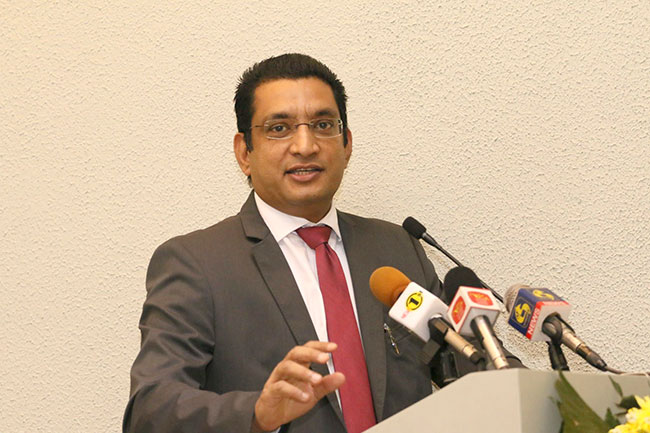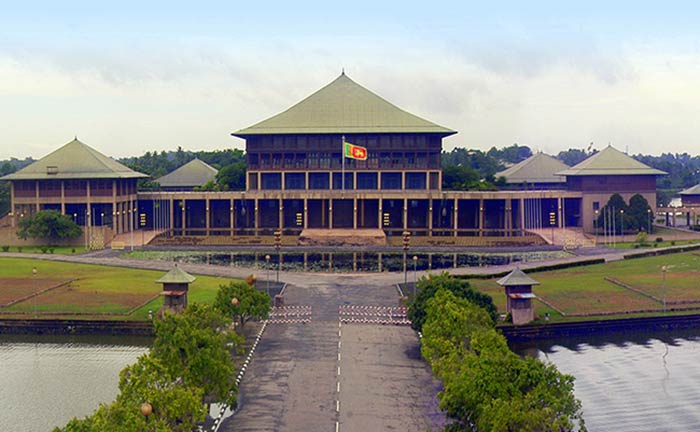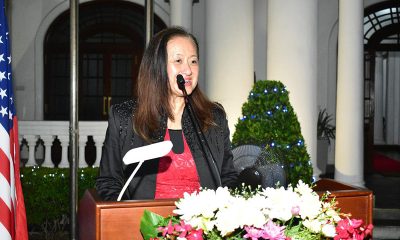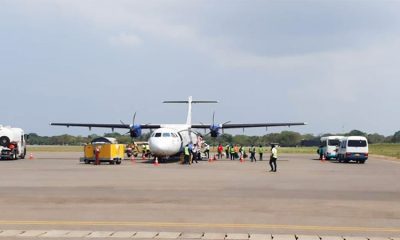News
Compromise formula: Gazette on Ven. Gnanasara’s PTF diluted; Sabry pacified

By Shamindra Ferdinando
The government has amended a controversial Gazette dated Oct 26, 2021on the appointment of Presidential Task Force (PTF) headed by Ven. Galagodaatte Gnanasara to examine the implementation of ‘One Country, One Law’ principle and prepare a draft Act following strong objections by Justice Minister Ali Sabry, PC.
SLPP National List lawmaker Sabry declared that he couldn’t remain the justice minister unless the authority given to the PTF over the justice ministry was done away with. The PTF consisted of 13 persons.
In addition to being tasked with formulating a draft Act, Ven. Gnanasara’s PTF, in terms of the Oct 26,2021 gazette has been asked to study the draft Acts and amendments that have already been prepared by the Ministry of Justice in this regard and propose suitable amendments depending on the requirement.
The President’s Office has issued instructions to amend the relevant gazette following the Justice Minister discussing the grave issue with President Gotabaya Rajapaksa on Nov 05.
Subsequently, a new gazette dated Nov 06 wholly removed the terms of references as in the previous gazette and tasked the PTF to submit proposals for ‘formulating a conceptual framework ideally suited for Sri Lanka after making a study of the said concept taking into account the views and opinions held by various parties with regard to the implementation of the concept “One Country, One Law” principle.
President Gotabaya Rajapaksa has established the PTF in terms of Article 33 of the Constitution. The first meeting of the PTF took place at Ven. Gnanasara’s temple on the Rajagiriya-Nawala road.
According to the second gazette, two members of the original PTF namely Prof. Dayananda Banda and lecturer Mohomad Inthikab have quit the outfit and Ramalingam Chakrawarthy Karunakaran, Ms. Yogeswari Patgunarajah and Iyyampillai Dayanandaraja have since been included.
The original PTF didn’t include Tamils or at least a single woman. The new PTF comprises 14 including one woman.
Sources said that Minister Sabry, who had an opportunity to discuss the matter before President Gotabaya Rajapaksa left the country on Oct 30 to attend a UN event in Glasgow, Scotland made further representations on Nov 05, the day the President returned to the country.
Sources said that the issue could have been easily avoided if matters pertaining to the justice portfolio were at least discussed with the ministry.
President Rajapaksa told a public gathering at Weeraketiya last Saturday (6) why he invited Bodu Bala Sena (BBS) General Secretary Ven. Gnanasara to head that particular PTF as he was pushing for ‘One Country, One Law’ concept during the past four years.
Sources said that the issuance of the second gazette had effectively prevented the PTF interference in matters coming under the Justice Ministry. At the onset Minister Sabry offered to quit the portfolio if Ven. Gnanasara remained in the PTF. Compromise formula was for the President’s Counsel to remain and to dilute the gazette, they said.
The Bar Association of Sri Lanka (BASL) taking into consideration the appointment of a convicted person for contempt of court as Chairperson of the PTF, strongly criticized the move.
The BASL alleged that the PTF would usurp the functions of many institutions established under the Constitution, including Parliament as well as the Ministry of Justice.
News
Parliament workers on warpath over allowance reductions

Parliamentary staff members are contemplating trade union action in protest against what they describe as a downward revision of their allowances.
The salary revision, as detailed in a circular numbered DMS/Salary Revision/2025-1 (Management Services Circular 04/2025) dated March 25, 2025, has resulted in a reduction of Parliament workers’ allowances, and the decreases which vary, based on staff grades, range from 70% to 39%, raising concerns among Parliament staff, according to sources.
The 32-page circular, addressed to Secretary General of Parliament Kushani Rohanadheera, has been signed by Secretary to the Ministry of Finance, Planning, and Economic Development K. M. Siriwardhana.
Following the announcement of those revisions, parliamentary employees have expressed dissatisfaction, with their unions planning industrial action in the coming days. Sources confirmed that the staff members had already registered their protest with the parliamentary authorities.
The new salary revision has sparked widespread discontent among staff members.
Our attempts to contact General Secretary of Parliament Kushani Rohandheera were not successful.
By Saman Indrajith
News
Japanese funding for project meant to help gender-based violence victims

Japan has funded a project to strengthen Sri Lanka’s commitment to tackling GBV (gender-based violence) and ensuring that survivors were not left without access to critical services.
As part of this project, six more Emergency Waiting Areas (EWAs) will be established in the coming weeks in Dharmapuram (Kilinochchi district), Murunkan (Mannar district), Uppuveli (Trincomalee district), Opanayake (Ratnapura district), Walapane (Nuwara Eliya district), and Modera (Colombo district).
Recently, Japanese ambassador in Colombo Akio Isomata and UNFPA Sri Lanka Representative Kunle Adeniyi, handed over the newly constructed Japan-funded EWA at the Kalutara South Police Station. The Japanese embassy said that this initiative was meant to ensure that survivors received the protection, dignity, and support they deserve when seeking assistance from law enforcement authorities.
The embassy said that there was a growing network of operational EWAs across Sri Lanka, including Jaffna, Mirihana, Pudukuduirippu, Nuwara Eliya, Mundalam, Batticaloa, and Kandy, where over 4000 women and children received support last year. These safe spaces serve as temporary resting areas, providing survivors of GBV with protection, psychosocial support, medical referrals, legal aid, and a survivor-centered approach to justice, the embassy said.
The establishment of the Kalutara South EWA was made possible with the generous funding of USD 34,000, from the People of Japan, and the construction was supported by World Vision Lanka.
Ambassador Isomata reaffirmed Japan’s continued dedication to supporting women and children in Sri Lanka and emphasized the role of safe spaces in ensuring a future free from violence. “Japan has been promoting the protection of women and children in Sri Lanka since Sri Lanka became a partner country for Japan in 2018 in promoting the Women, Peace and Security agenda. This project also includes training for police officers handling victims, especially female officers, so that victims would feel safer in seeking refuge and counseling. I hope this project will be expanded by Sri Lanka’s Ministry of Public Security and Police in order to strengthen the mechanism to protect women and children in vulnerable situations. It is also essential for Sri Lanka to ensure the legal measures against the violence and support for the self-reliance of women and children who seek refuge.”
Speaking at the ceremony, UNFPA Sri Lanka Representative, Kunle Adeniyi, underscored the significance of survivor-centered approaches in addressing GBV. “For a survivor, the decision to seek help is often fraught with fear: fear of judgment, disbelief, or retaliation. When they walk into a police station, they should not only find protection but also compassion and care. A survivor’s first interaction with law enforcement can shape their entire journey toward healing and justice. If they are met with understanding, respect, and support, they are more likely to pursue the help they need.”
News
Outgoing US Ambassador tells Lanka to train its citizens to ensure peace through strength

Outgoing US Ambassador Julie Chung has stated that Sri Lanka needs to train its citizens not only for the jobs of the future, but also for the military of the future, to ensure it can maintain peace through strength.
Addressing the faculty and students at the National Defence College, Diner’s Club, in Colombo, recently, the Ambassador said: “I want to emphasize the critical links between prosperity and strength, and the connection between economic security and national security. Economic security is not just about prosperity – it is intrinsically linked to national sovereignty. A strong economy empowers a nation to make independent decisions, free from undue external influence. This is particularly crucial for Sri Lanka, given its strategic location and the economic opportunities and security risks associated with its maritime domain, including sitting on the sea lanes transporting 2/3 of the world’s oil. Sri Lanka’s ability to service and protect these shipping lanes is an economic opportunity, but it is also a national and regional security challenge, with regional competitors seeking their own advantages. As Sri Lanka’s economy strengthens, it will be better equipped to independently navigate these sensitive geopolitical waters.
“In recent years, Sri Lanka has seen these risks clearly. In the lead-up to the 2022 economic crisis, Sri Lanka found itself in a precarious position. Faced with mounting fiscal pressures and sustained public protests, the Sri Lankan government sought debt relief from creditor countries. This decision to bilaterally negotiate debt outside an IMF programme would ultimately be insufficient to avoid a default and opened the door for some nations to press Sri Lanka for political concessions while also leaving Sri Lanka vulnerable to economic coercion. Economic vulnerability can give foreign powers leverage over national decisions, impacting not just on the economy but the very fabric of national security.
“During my three years in Sri Lanka, I’ve seen a remarkable turnaround in the country’s economy, but the journey is far from over. A quarter of Sri Lankans are still living in poverty. Sri Lanka still depends on a handful of industries for most of its foreign currency and most of its growth. Inefficient state-owned enterprises burden the economy while red tape and opaque regulations hamper foreign investment. Now that the economy has stabilised, long-needed structural reforms are the necessary next step to ensure Sri Lanka gets on a long-term growth path. Sri Lanka needs to train its citizens not only for the jobs of the future, but also for the military of the future, to ensure it can maintain peace through strength.
“The Indo-Pacific region remains one of the most politically dynamic and economically influential areas in the world. As an island maritime nation, Sri Lanka’s economic security and national security are directly tied to the maritime domain. Because of this, we all have a stake in keeping an open, free, and peaceful Indo-Pacific.
“Sri Lanka’s commitment to this goal strengthens its security framework, aligning with global standards and practices. Given its critical location in the Indian Ocean, maritime domain awareness is essential to ensuring our trade routes in the region remain secure and unhindered. These routes are the lifeblood of Sri Lanka’s economy, and by safeguarding them, Sri Lanka is safeguarding its future,” she said.
-

 Sports3 days ago
Sports3 days agoSri Lanka’s eternal search for the elusive all-rounder
-

 News4 days ago
News4 days agoGnanasara Thera urged to reveal masterminds behind Easter Sunday terror attacks
-

 Business5 days ago
Business5 days agoAIA Higher Education Scholarships Programme celebrating 30-year journey
-

 News2 days ago
News2 days agoBid to include genocide allegation against Sri Lanka in Canada’s school curriculum thwarted
-

 News3 days ago
News3 days agoComBank crowned Global Finance Best SME Bank in Sri Lanka for 3rd successive year
-

 Features3 days ago
Features3 days agoSanctions by The Unpunished
-

 Latest News1 day ago
Latest News1 day agoIPL 2025: Rookies Ashwani and Rickelton lead Mumbai Indians to first win
-

 Features3 days ago
Features3 days agoMore parliamentary giants I was privileged to know




















